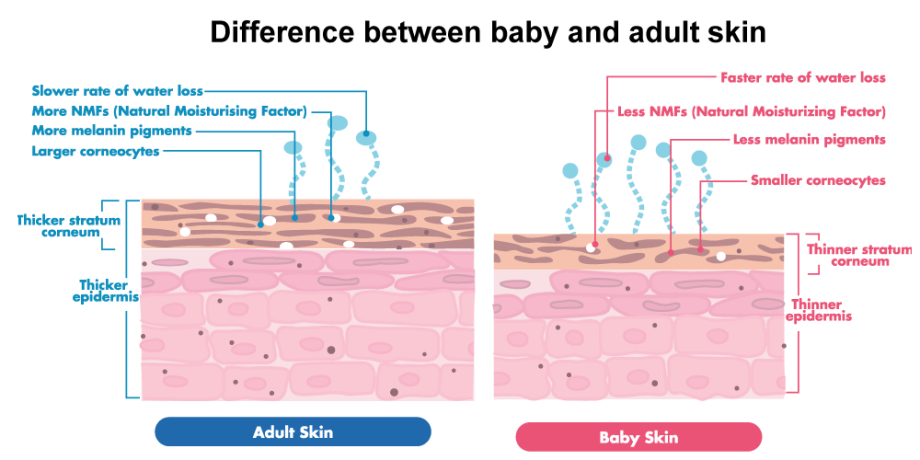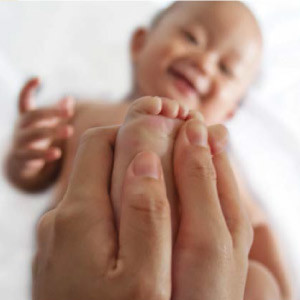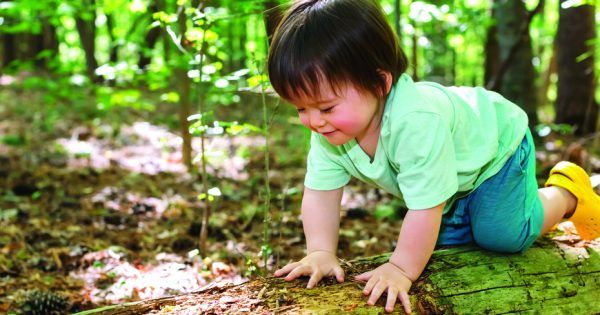The sense of touch is one of the most important senses for human beings. Studies have shown that children who receive more warmth and affection from their mothers in the form of physical contact tend to be more resilient to pressure, frustration and distress.
In the womb, the skin is the first sensory organ to develop in the foetus and is the most developed sense at birth. In fact, as early as 6 weeks after conception, when the baby is just 3 cm long, it reacts to the gentle stimulation of its newly formed skin. This happens long before the baby develops eyes and ears. For 9 months before being delivered, the baby is cocooned in the warm secure environment of the mother’s womb – it is for this reason that newborns are wrapped tightly in a cloth to re-create that warmth & security.
Understanding the structure and function of the skin will help us appreciate better, the importance of touch. The skin is the largest organ of the body and its functions include (i) protecting the body from irritants, allergens, bacteria & ultraviolet (UV) light, (ii) regulating body temperature, (iii) experience the senses of touch, pain, temperature, (iv) removal of waste products through sweat , and (v) production of vitamin D.
Did you know?
Your baby’s skin is different from adult skin and continues to develop over the first year of life. The baby’s skin is 30% thinner compared to adult skin. Besides being less mature, the baby’s skin loses water faster, is more vulnerable to the environment and more sensitive to sunlight. The structure of the baby’s skin makes it more prone to irritation, infection and allergies compared to adults.

Importance of touch
The first 3 years of life are critical for the brain development of babies. The development of the brain depends on the type of stimulation provided to the baby through the senses of touch, hearing, vision and smell. In this article we will focus on the invaluable impact of touch on development of the baby.
Several studies have demonstrated the importance of skin-to-skin contact for development of growing babies. Touch has been found to show benefits such as mother-infant attachment, parental satisfaction, and a better home environment. Mother-infant skin-to-skin contact has also shown to reduce pain in newborns. Touch has also demonstrated to significantly impact breastfeeding, blood sugar levels after birth, and infant crying. In fact even for pre-term babies, touch has been found to have a positive impact – those babies who experienced skin-to-skin contact (“kangaroo care”) while feeding showed significant improvement in their nervous system development.
Stimulating your baby through TOUCH:
As a parent, you may ask: What is the best way to stimulate by baby’s development through touch? Babies simply adore being in close, physical contact with their parents or caregivers – they thrive on affection. In fact, they say that one can never over-do it when it comes to affection showered on babies. A simple method to quickly calm your baby is to cradle him/her in your arms and rock them. Cuddling, caressing, holding and rocking are all important to your baby. Simple loving gestures such as stroking their hair or back as you hold them not only conveys your love and affection, but also soothes, comforts and reassures them. In addition, there are two daily rituals that can serve as excellent opportunities to stimulate the sense of touch in your baby – bathing and massage.
Bathing:
Massage:

The physical benefits include babies gaining weight faster as massage improves digestion and absorption by stimulating the gastrointestinal hormones and also relieving constipation and colics in babies. Another physical benefit is improving the quality and duration of sleep.
The emotional benefits of massage are that these babies are more sociable – infants who are massaged tend to greet people with more eye contact, reaching out, smiling and vocalizing. Massaged infants tend to be happier as touch reduces fussing and crying.
Did you know?
- When massaging your baby, you may use either oil or lotion. This helps in reducing the friction on the baby’s delicate skin during massage and also moisturizes their skin.
- When using oil for massage, select ‘baby oil’ that is formulated to be safe, mild and effective for the baby’s skin. Avoid using cooking oils (olive or mustard oil) as they have a high content of oleic acid that can damage the baby’s fragile skin and lead to skin problems).
- However, massaging without oil or lotion is alright too.
There are plenty of opportunities for you to make touch an integral part of your baby’s life. After all, this is the simplest form of non-verbal communication that conveys affection, security & reassurance. Make touch an integral part of your daily baby rituals like bathing and massage. These special moments during your baby’s growing years will not only impact his emotional, mental and physical development but also forge a strong bond with the family. So the next time you are with your baby – touch more, hold more, hug more.
An educational contribution by Malaysian Paediatric Association.







Comments